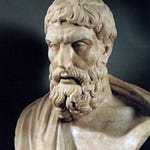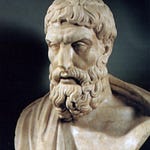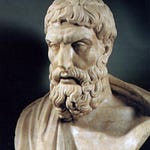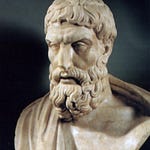“You should do and practice all the things I constantly recommended to you, with the knowledge that they are the fundamentals of the good life.
First of all, you should think of deity as imperishable and blessed being, … and you should not attribute to it anything foreign to its immortality or inconsistent with its blessedness.
The gods do indeed exist, since our knowledge of them is a matter of clear and distinct perception; but they are not like what the masses suppose them to be. …
The masses, by assimilating the gods in every respect to their own moral qualities, accept deities similar to themselves and regard anything not of this sort as alien.
Second, you should accustom yourself to believing that death means nothing to us, since every good and every evil lies in sensation; but death is the privation of sensation.
Hence a correct comprehension of the fact that death means nothing to us makes the mortal aspect of life pleasurable, not by conferring on us a boundless period of time but by removing the yearning for deathlessness. …
This, the most horrifying of evils, means nothing to us, then, because so long as we are existent death is not present and whenever it is present we are nonexistent. …
The sophisticated person neither begs off from living nor dreads not living. …
As in the case of food he prefers the most savory dish to merely the larger portion, so in the case of time he garners to himself the most agreeable moments rather than the longest span. …
Much worse off is the person who says it were well not to have been born ‘but once born to pass Hades’ portals as swiftly as may be.’
Now if he says such a thing from inner persuasion why does he not withdraw from life? Everything is in readiness for him once he has firmly resolved on this course.
But if he speaks facetiously he is a trifler standing in the midst of men who do not welcome him.”
(Letter to Menoeceus, I.1)












Share this post